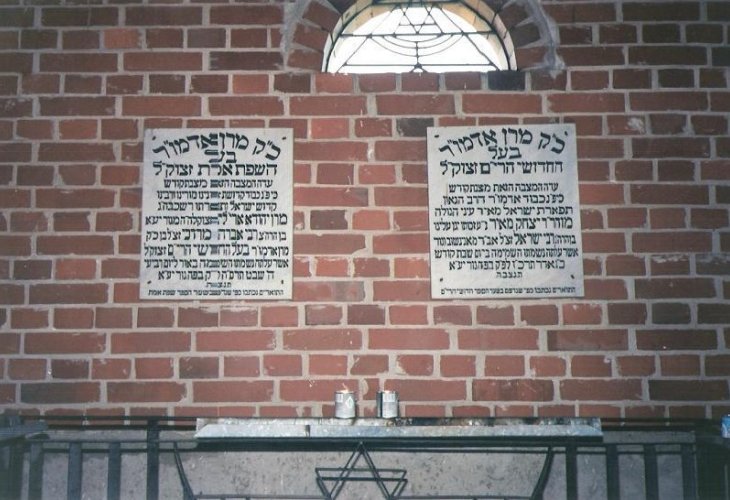Torah Personalities
Rabbi Yehuda Aryeh Leib Alter: The Sefat Emet Who Carried the Pain of His People
A tribute to the Gerrer Rebbe’s leadership, teachings, and profound compassion
 The graves of Rabbi Yitzchak Meir Alter and his grandson Rabbi Yehudah Aryeh Leib Alter in Góra, Poland.
The graves of Rabbi Yitzchak Meir Alter and his grandson Rabbi Yehudah Aryeh Leib Alter in Góra, Poland.The 5th of Shevat, marks the yahrzeit of the second Rebbe of the Gur (Gerrer) Chassidic dynasty, Rabbi Yehuda Aryeh Leib Alter, author of Sefat Emet.
Following are 10 facts about his towering legacy
1. The Second Rebbe of Gur and a Central Leader of Polish Jewry
Rabbi Yehuda Aryeh Leib Alter (29 Nisan 5607 – 5 Shevat 5665 / 1847–1905) served as the second Rebbe of the Gur dynasty and was among the most prominent leaders of Polish Jewry at the end of the 19th century. Under his leadership, the Gur community became the largest Chassidic group in Poland.
2. Called Sefat Emet After His Famous Sefer
Rabbi Alter became known by the name of his book, Sefat Emet, which was published immediately after his passing.
The work, consisting of five volumes, contains his teachings and discourses on the Torah and Jewish festivals. These were delivered during Shabbat and holiday talks, and afterward he would write them himself from memory. Sefat Emet remains one of the most widely studied Chassidic works.
3. Born Into the Dynasty
He was born in Warsaw on 29 Nisan 5607 (1847) to Rabbi Avraham Mordechai, son of Rabbi Yitzchak Meir Alter, the Chiddushei HaRim, founder of the Gur dynasty.
4. Orphaned at a Very Young Age
His mother passed away when he was just two years old. Six years later, his father died as well, and the young Yehuda Aryeh Leib was raised in the home of his grandfather, the Chiddushei HaRim.
5. His Leadership and His Final Years of Agony for His Chassidim
After the passing of his grandfather, the Sefat Emet assumed the leadership of the Gur community with great strength and wisdom.
He became one of the most influential leaders of Polish Jewry in his generation.
He passed away at the age of only 58, on the 5th of Shevat 5665 (1905). His chassidim believed that his early passing was due to the deep anguish he felt over the thousands of his followers drafted into the Russian army during the Russo–Japanese War. Family members testified that throughout the war he slept on the floor, covered only with his coat, weeping over their suffering.
6. Buried in Gur; A Massive Funeral
He was buried in the town of Gur, beside his grandfather, the Chiddushei HaRim. Around 20,000 people attended his funeral.
Because of Gerrer custom, no eulogies were delivered — except for one short eulogy by the Rebbe of Sochatchov, who only said:
“This Jew passed away because of the troubles of Israel.”
7. “Sefat Emet” — The Name Chosen From His Final Teaching
His sefer was published after his passing and includes all his Torah teachings from Shabbatot and holidays during his years as Rebbe.
The name Sefat Emet (“a truthful tongue”) comes from the verse with which he concluded his final discourse: “Sefat emet tikon la’ad”—“A truthful tongue will be established forever.”
8. His Teachings on Exile and Redemption
In Sefat Emet he wrote: “The lengthening of the exile serves to ease the birth pangs of Mashiach.” Rabbi Naftali of Ropshitz explained this to mean that the pressure of exile atones for Israel, softens harsh judgments, and hastens the redemption.
9. The “Sefat Emet Yeshiva” Established in His Memory
In 1921, the Sefat Emet Yeshiva was founded in Jerusalem in his honor. It became the central institution of Gur Chassidus in Eretz Yisrael.
10. His Descendants and Legacy
One of his sons, Rabbi Avraham Mordechai Alter, the Imrei Emet, succeeded him as Rebbe of Gur and served as President of the Moetzes Gedolei HaTorah. The Sefat Emet had several sons — four died young, and two were murdered in the Holocaust.
May his memory be a blessing and his merit protect us.

